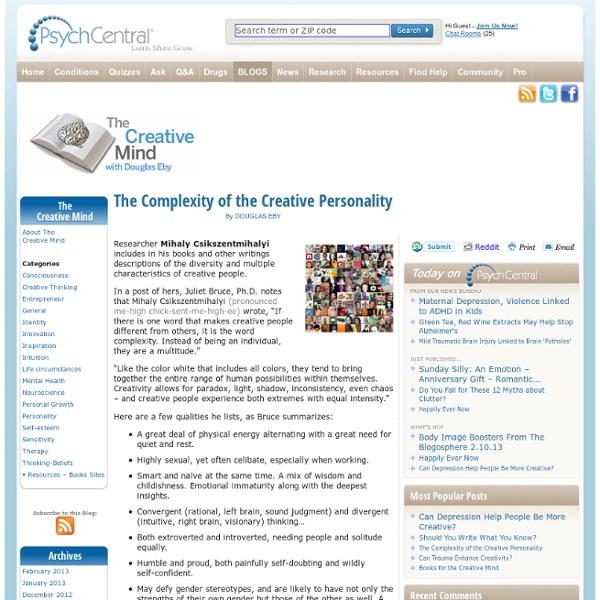Top 10 Strange Phenomena of the Mind
Humans The mind is a wonderful thing – there is so much about it which remains a mystery to this day. Science is able to describe strange phenomena, but can not account for their origins. While most of us are familiar with one or two on this list, many others are mostly unknown outside of the psychological realm.
Resources for Developing Creativity and Innovation
Links to a variety of sites with articles on creativity research by multiple authors, plus courses, programs & books for developing creativity and innovation. Sites / Blogs- – - - Creating in Flow – “Insights and advice about all forms of creative expression” – By Susan K. Perry, PhD, a social psychologist, writer, and writing consultant. Creativity at Work: Developing creativity and innovation in organizations
Questionnaires for Writing Character Profiles - Creative Writing Help
Enter your e-mail to get the e-book for FREE. We'll also keep you informed about interesting website news. "I have searched the web and used different worksheets, but none have come close to your worksheets and descriptions of (what to do and what not to do). Both courses I have taken have with Creative Writing Now have been amazing.
That’s Not OCD, You’re Just a Slacker
Of all the random pictures floating about the internet that I’ve run into in the past few weeks, this is the one that really got me: Here’s the text: A 23-year old medical student makes lists of all the tasks that he must accomplish each day. He spends hours studying and refuses to go out with his colleagues even when there are no tests on the immediate horizon, preferring to spend his time looking at specimens in the laboratory. He keeps meticulous notes during all his classes and prefers to attend every lecture, not trusting his colleagues to take notes for him. He is doing well in school and has a girlfriend who is also a medical student.
Einstein, music lessons and opening the mind
This story is from Jerome Weidman, with no known copyright info. Thanks to Akshar Smriti for posting it. I'm only re-posting to update the formatting.
Chekhov's gun: a useful plot device.
By Glen C. Strathy Chekhov's Gun is a plot device whereby you introduce an item in the first part of your novel that doesn't seem important to the story at the time, but takes on greater significance later on. The principle was expressed by the great Russian playwright, Anton Chekhov, who said that if you put a gun on stage in the first act of a play, it should be fired in the second act. According to some sources, he also expressed this in the negative form as: don't put a gun on stage in the first act unless you intend to have it fired in the second.
Field Guide to the Loner: The Real Insiders
Miina Matsuoka lives by herself in New York City. She owns two cats and routinely screens her calls. But before you jump to conclusions, note that she is comfortable hobnobbing in any of five languages for her job as business manager at an international lighting-design firm. She just strongly prefers not to socialize , opting instead for long baths, DVDs, and immersion in her art projects. She does have good, close friends, and goes dancing about once a month, but afterward feels a strong need to "hide and recoup."
The Creative Benefits Of Exploring The Uncomfortable
At Grey New York, someone had the radical idea that to be creative, you need time to think creatively and not be at the mercy of relentless calendar invites. Our boss, Tor Myhren, agreed and instituted the Thursday Morning No-Meeting Zone from 9 a.m. to 12:00 p.m. This is officially sanctioned time for us to expand our minds and devote time to ideas that kept getting pushed to the side, using whatever methods worked for us. And not just for the writers and art directors.
Themes & Things To Keep In Mind When Writing Fantasy Stories and Adventures » Daily Encounter
This list is far from complete. It’s not even trying to be complete. It knows better than that. It just wants to be helpful and provide some inspiration here and there; you know, offer little suggestions that might lead to bigger ideas.
The Top 10 Psychology Studies of 2010
The end of 2010 fast approaches, and I'm thrilled to have been asked by the editors of Psychology Today to write about the Top 10 psychology studies of the year. I've focused on studies that I personally feel stand out, not only as examples of great science, but even more importantly, as examples of how the science of psychology can improve our lives. Each study has a clear "take home" message, offering the reader an insight or a simple strategy they can use to reach their goals , strengthen their relationships, make better decisions, or become happier. If you extract the wisdom from these ten studies and apply them in your own life, 2011 just might be a very good year. 1) How to Break Bad Habits If you are trying to stop smoking , swearing, or chewing your nails, you have probably tried the strategy of distracting yourself - taking your mind off whatever it is you are trying not to do - to break the habit.
The Age of the Artist–Time for a Revolution
I’ve said many times before that it is an amazing time to be a writer. Yet, I think this age, this new Digital Renaissance might actually be more than we can imagine, and age of empowerment artists have never before experienced. We just need to be open to the future.



